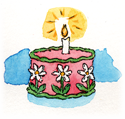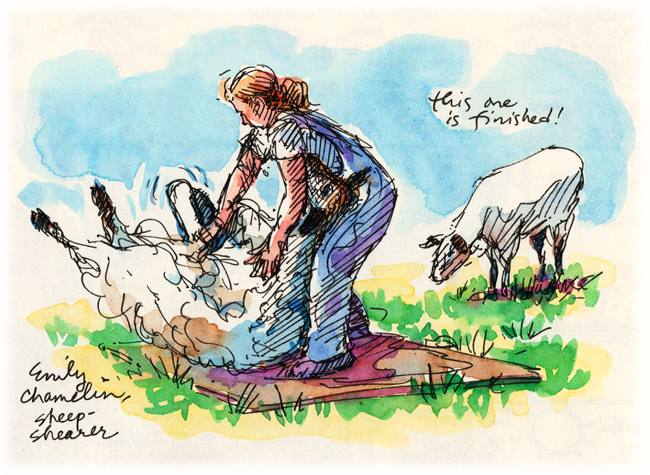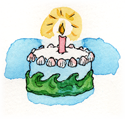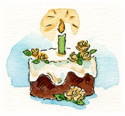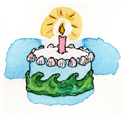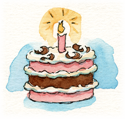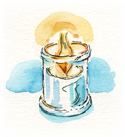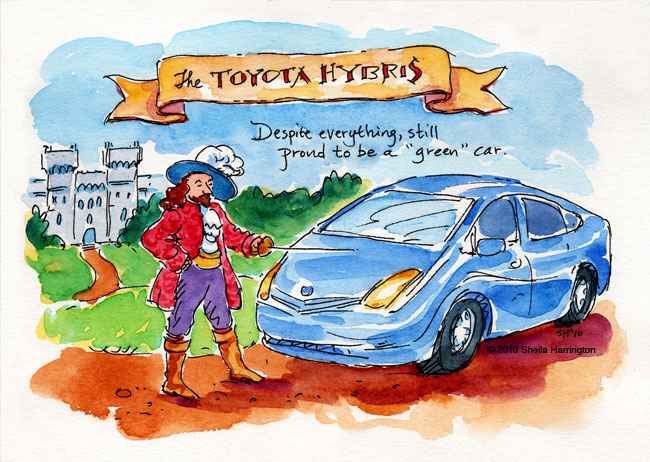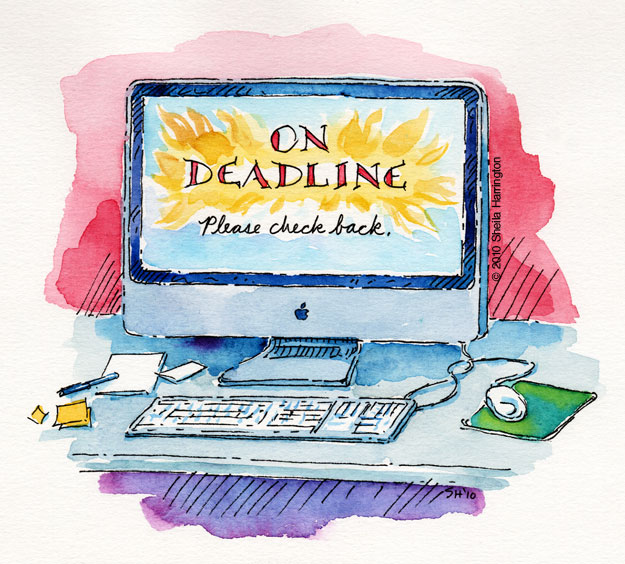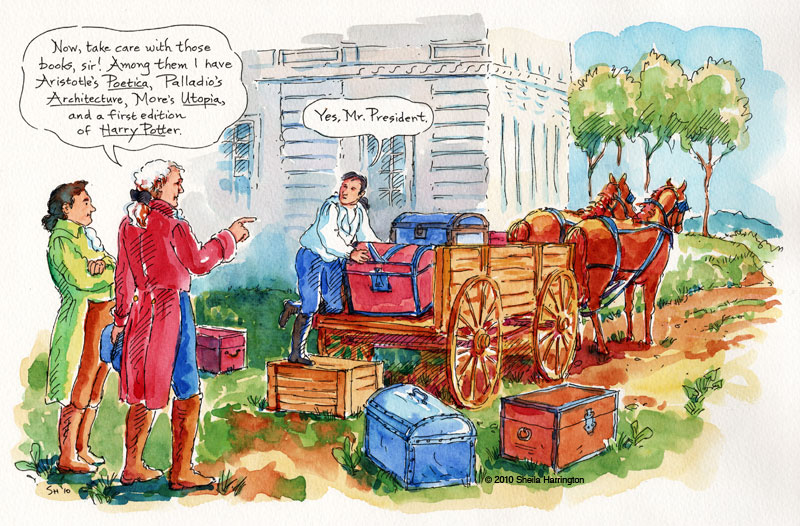In looking through my sketchbooks I came across this drawing made ten years ago (!!!) of the daughter of old friends (and now a grown-up friend herself)—the delightful, smart and multi-talented Hallie, whose birthday it is today. Here she is diligently, and characteristically, doing her homework. Happy Birthday, Hallie! I hope you have raspberries and whipped cream for breakfast.
Tag: Pen&Ink
Come, Lovely May
Here are the lovely grounds of the neighborhood Marriott Wardman Park hotel before they cut down most of the trees. Sigh. My daughter was skipping along, filling a basket with fallen blossoms.
Come, lovely May, with blossoms
And boughs of tender green,
And lead me over the meadows
Where cowslips first were seen.
For now I long to welcome
The radiant flowers of spring,
And through the wild woods wander,
And hear the sweet birds sing.
—Traditional
Sorry…
Sheep-Shearing
A speedy fleecing at the Sheep and Wool Festival in Howard County, Maryland.
This image is now available as an 8.5″ x 11″ archival high-resolution print.
Energy-Efficient Vehicle #4
Energy-Efficient Vehicle #3
Energy-Efficient Vehicle #2
Still On Deadline
Library of Congress-Part 1
On this day in 1800, President John Adams approved legislation appropriating $5,000 to fund a hitherto nonexistent Congressional library.
Now, when the United States was young and the ink was still drying on the [mostly] ratified Constitution, its first Congress met for a short while (1790 to 1800) in Philadelphia. This contender for the role of Nation’s Capital was merely a disappointed temporary location, resigned to the government’s eventual transfer south. In the meantime, however, Philadelphia was, thanks largely to William Penn and Benjamin Franklin, a highly livable city—the most populated in the country (Washington, DC wasn’t even in the Top Twenty), with paved and lighted streets lined with sidewalks, fine masonry buildings, a university, a hospital, a fire department, gardens and parks, theaters and shops and philosophical societies and libraries—much like today, but without WiFi. The Library Company of Philadelphia offered the use of its fine collection to members of Congress free of charge, at a time when library use was by paid subscription.
When the government packed up and trudged southward to the Potomac in 1800, they said to one another in despair, “Where in this muddy village of farms, taverns, and unfinished government buildings will we do the research and study necessary for Congressional legislation and malediction?”
Fortunately, the previous Congress had been planning ahead, and in 1801, a collection of 740 books and three maps, purchased with the appropriated funds, arrived from London. They were stored, along with the papers Congress had brought from Philadelphia, in a room of the partially-built Capitol Building. It was primarily a collection of legal, economic, and historical works. The next President, Thomas Jefferson (He Who Must Not Be Named in Texas), a voracious scholar himself—if there was any subject that never interested him it is apparently unrecorded—signed a law creating the post of Librarian of Congress.
Fire is a perpetual threat to the flammable cities of civilization, and disaster can result merely from an unsnuffed candle. The Library has suffered from several, mostly minor, fires. But in August 1814, during the War of 1812, the British set about destroying Washington’s public buildings, to avenge the Americans’ destruction of the public buildings of Toronto. Although parts of the Capitol held up remarkably well, its interior, filled with wooden furniture, paintings, and irreplaceable documents and books, was highly flammable. That was the end of the library.
But only temporarily. Because Jefferson, now in retirement and short of cash, offered to sell his personal library to the U.S. government as the foundation of a new collection. So in 1815 he was paid $23,900 for his 6,487 books, which arrived by horse and wagon from Monticello.
What a collection it was. Not only works of law, economics, and history, to replace the lost books. But also: Biography. Geography. Chemistry. Botany. Medicine. Anatomy. Architecture. Philosophy. Painting and sculpture. Theater. Music. Literature. Essays. Mythology. Religion (including a copy of the Koran). And not only in English, but also works in French, Spanish, German, Latin, Greek, and Russian, several of which languages Jefferson spoke or read.
Some members of Congress objected to the collection’s breadth, explaining rather myopically, “the library was too large for the wants of Congress,” but Jefferson famously responded, “There is…no subject to which a member of Congress may not have occasion to refer,” and that statement has guided the Library in its acquisitions over the years.






